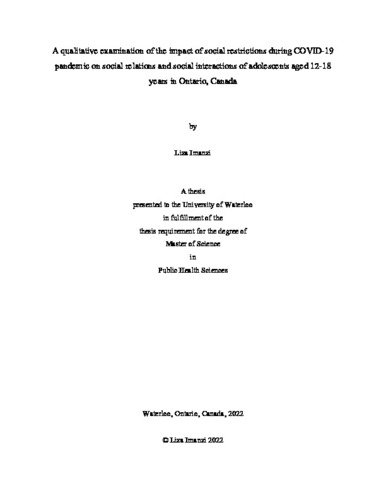| dc.description.abstract | Background: The novel coronavirus outbreak (COVID-19) was declared a global pandemic by the World Health Organization (WHO) in March 2020 (WHO, 2020). The government of Ontario declared a stay-at-home order where schools were closed, and remote learning was used as an alternative to in-person learning. Adolescents were affected by these measures in many aspects, including experiencing elongated social isolation, social deprivation and losing in-person interaction with their peers (Orben et al.,2020). Adolescents undergo physiological changes, including changing neurotransmitters such as serotonin and dopamine, which affect the volatility and frequency at which their emotions changes (Bailen et al., 2019). Adolescents also experience change within their interpersonal relationships and interactions, mainly with their peers and parents (Brechwald & Prinstein, 2011). There is a need, therefore, to further research and understand how COVID-19-related stressful experiences such as social isolation could have potentially affected adolescents’ relationships.
Objectives: This study aimed to examine how school closures, social distancing, and other types of social restrictions applied during the COVID-19 pandemic in Ontario, affected social relationships and social interactions of adolescents aged 12-18.
Methods: In this qualitative study, Interpretative Phenomenological Analysis (IPA) was used to enable the researcher to examine the lived experiences of adolescents during the pandemic, focusing specifically on the changes in their relationships and social interactions. This goal was achieved through conducting open-ended interviews with 7 adolescents (ages 15-18) who live in Ontario. Participants were recruited through social media, emails and posters. Interviews lasted be-tween 60-90 minutes in length were conducted through Microsoft Teams Video Tool, and the data was recorded and analyzed inductively using IPA.
Results: A difference between the male and female gender was observed, where male participants were less likely to mention their need for social interactions than female participants. The study also found that for adolescents, friends played a role in coping with the pandemic. Finally, the participants started to overcompensate for social interactions after the pandemic restrictions were relaxed, because of the opportunities they felt they missed out on during isolation.
Conclusion: Throughout the pandemic, adolescents' relationships were affected due to lack of social interactions during lockdowns. This study can be used to guide future policies to have less of a negative impact on adolescents as a further step to prepare for future potential social isolation situations. The findings can also be used as a baseline for future studies to understand the long-term effects adolescents have when exposed to long periods of social isolation. | en |

